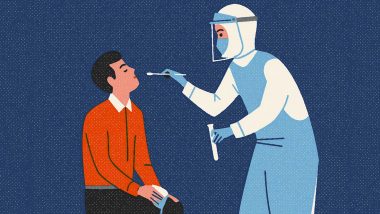New Delhi, Jun 12: With the protracted lockdown pushing the Indian economy into deep recession in the current fiscal, the escalating new COVID-19 cases after easing of restrictions poses further downside risks to the economic outlook, IHS Markit said on Friday.
A national lockdown began on March 25 and has continued in various phases into the month of June, albeit with significant easing of restrictions since early May.
"This protracted lockdown has resulted in the severe disruption of industrial production and consumer spending, with GDP growth forecast to contract sharply during Q2 2020 (April-June), pushing Indian GDP growth for the 2020-21 financial year into a deep recession," it said in a commentary on assessing the impact of COVID-19 on the Asia Pacific region.
April Purchasing Managers' Index (PMI) data, reflecting the full impact of the lockdown measures, indicated a collapse of business activity, with the Composite Output Index plummeting to 7.2 in the month - a record low in the 14.5-year survey history and one that was extreme overall.
Also Read | Sony PlayStation 5 Gaming Console Launching Tonight; Watch Livestream of Sony's Future of Gaming Event.
"While both manufacturing and service sectors were severely battered by the COVID-19 responses, the latter posted sharper reduction of business activity," it said.
IHS said, unlike many other countries which have eased lockdown measures, India has faced continued escalation in the number of daily new COVID-19 cases.
"Consequently, the future path of lockdown measures remains highly uncertain, particularly if new daily cases continue to escalate," it said.
New COVID-19 cases are still escalating in India due to large populations and dense urban areas, as well as very weak healthcare systems, it said, adding that this poses further downside risks to the economic outlook.
As a result of the lockdown measures, Indian industrial production was heavily disrupted during late March and during April, although a limited restart of certain industries has gradually occurred since April 22.
In the auto sector, production largely shut down when the lockdown commenced in late March, with large automakers as well as two-wheeler makers having temporarily closed their plants for most of April before lockdown conditions started to be gradually eased.
Firms manufacturing auto components also had shut down temporarily due to the lockdown. The Society of Indian Automobile Manufacturers (SIAM) has estimated that the daily turnover lost for India's auto manufacturing sector for each day of closure amounts to around USD 300 million per day.
"Consequently, the COVID-19 pandemic intensified the recessionary conditions in India's auto industry, which had already experienced severe conditions in 2019, with a 12.7 per cent year-on-year decline in passenger vehicle sales, while commercial vehicle sales were down 15 per cent," IHS said.
The services sector has also been badly hit by the impact of lockdown measures on retail trade and the collapse of domestic travel and tourism.
The May PMI data showed a further severe decline in services business activity despite easing from April's record contraction.
New business plummeted further from April, reflecting the extent to which the COVID-19 restrictions had impacted the service sector. Business sentiment also turned negative for the first time since 2015, according to the latest PMI survey.
(The above story is verified and authored by Press Trust of India (PTI) staff. PTI, India’s premier news agency, employs more than 400 journalists and 500 stringers to cover almost every district and small town in India.. The views appearing in the above post do not reflect the opinions of LatestLY)













 Quickly
Quickly


